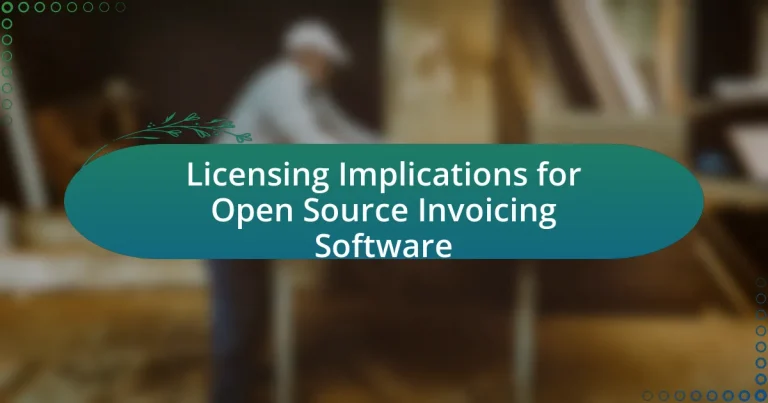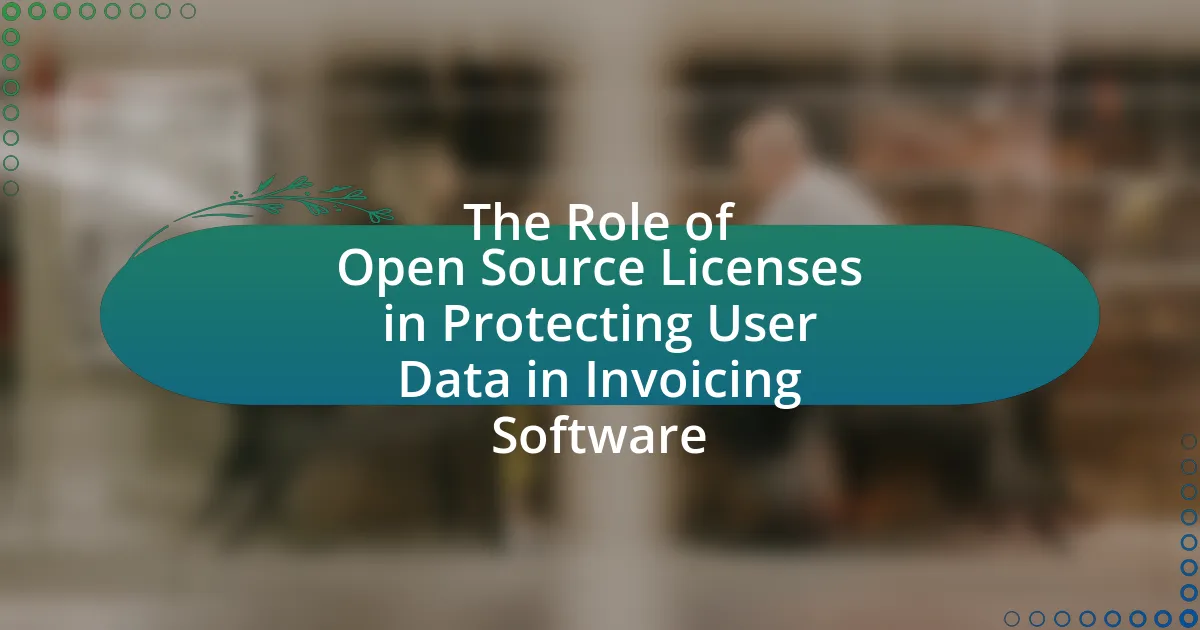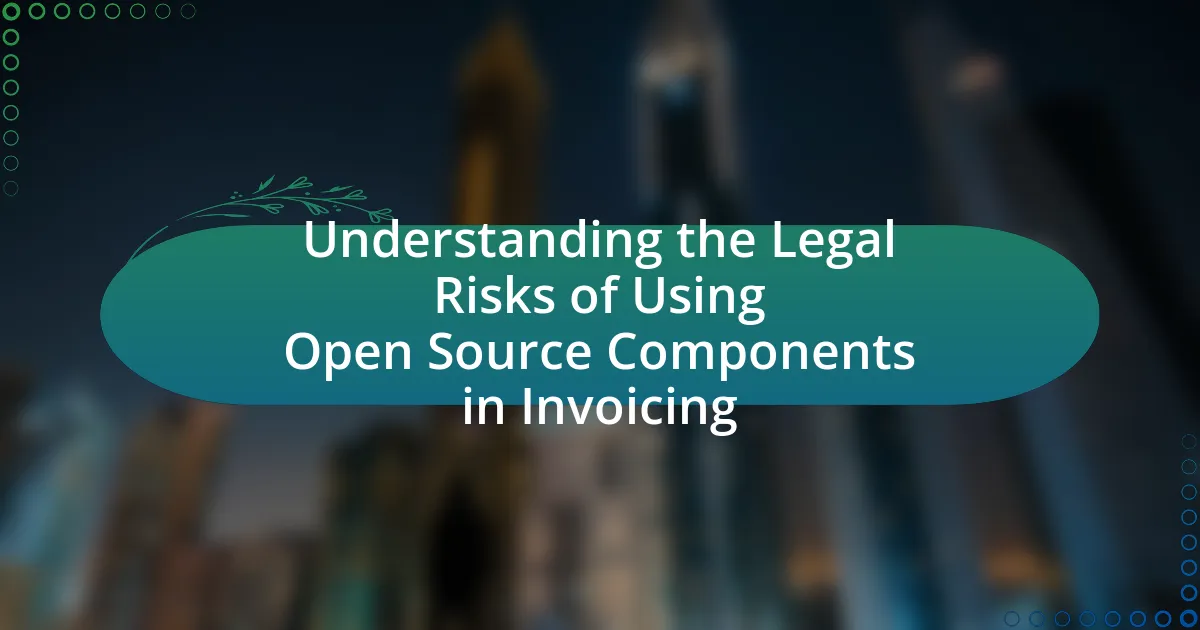The article focuses on the licensing implications for open source invoicing software, detailing how various licenses, such as the GNU General Public License (GPL) and the MIT License, dictate the usage, modification, and distribution of the software. It explores the differences between permissive and copyleft licenses, the most common licenses in use, and the legal considerations developers must be aware of, including compliance and potential risks. Additionally, the article discusses best practices for licensing, the impact of licenses on user adoption, and strategies for mitigating licensing risks, emphasizing the importance of clear communication and documentation in fostering a collaborative open source environment.
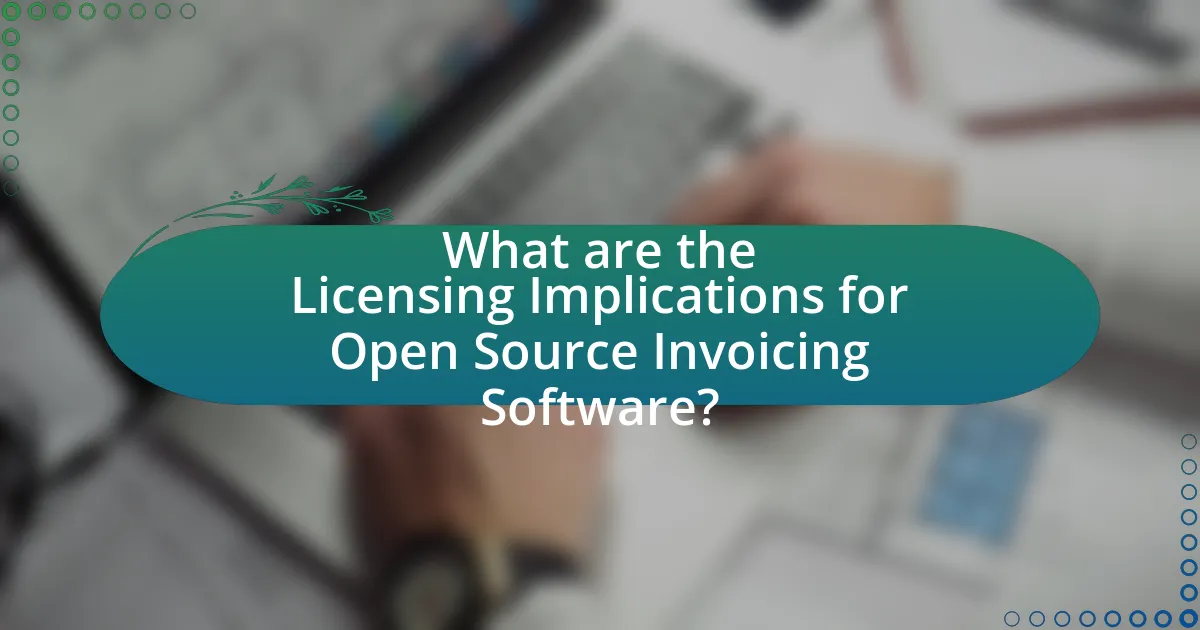
What are the Licensing Implications for Open Source Invoicing Software?
Open source invoicing software is subject to various licensing implications that dictate how the software can be used, modified, and distributed. The most common licenses include the GNU General Public License (GPL), which requires derivative works to also be open source, and the MIT License, which allows for more permissive use, including proprietary modifications. These licenses ensure that users understand their rights and obligations, such as the requirement to credit original authors and the potential need to share modifications under certain conditions. For instance, under the GPL, if a company modifies the software and distributes it, they must also provide access to the modified source code. This framework promotes collaboration and transparency while protecting the rights of both developers and users.
How do different licenses affect the use of open source invoicing software?
Different licenses significantly affect the use of open source invoicing software by dictating how the software can be modified, shared, and integrated into other projects. For instance, permissive licenses like MIT or Apache allow users to freely use, modify, and distribute the software without many restrictions, promoting wider adoption and integration into commercial products. In contrast, copyleft licenses such as the GNU General Public License (GPL) require that any derivative works also be open source, which can limit commercial use and encourage a more collaborative development environment. The choice of license thus influences the software’s usability, distribution, and potential for commercial exploitation, shaping the overall ecosystem of open source invoicing solutions.
What are the most common open source licenses used in invoicing software?
The most common open source licenses used in invoicing software include the GNU General Public License (GPL), MIT License, and Apache License 2.0. The GPL is widely adopted for its strong copyleft provisions, ensuring that derivative works remain open source. The MIT License is favored for its permissiveness, allowing for proprietary use while maintaining minimal restrictions. The Apache License 2.0 is also popular due to its permissive nature and explicit grant of patent rights, making it suitable for commercial applications. These licenses are prevalent in the open source community, as evidenced by repositories on platforms like GitHub, where projects often specify these licenses to clarify usage rights and obligations.
How do permissive licenses differ from copyleft licenses in this context?
Permissive licenses allow users to modify, distribute, and use the software with minimal restrictions, enabling proprietary derivatives, while copyleft licenses require that any modified versions of the software also be distributed under the same license terms, ensuring that the software and its derivatives remain open source. This fundamental difference impacts how open source invoicing software can be utilized and shared; for instance, permissive licenses facilitate broader adoption in commercial applications, whereas copyleft licenses promote a commitment to keeping the software free and open for all users. The implications of these licensing choices are significant for developers and businesses, as they influence the potential for collaboration, commercialization, and the long-term sustainability of the software.
What legal considerations should developers be aware of?
Developers should be aware of licensing agreements, intellectual property rights, and compliance with software regulations. Licensing agreements dictate how software can be used, modified, and distributed, which is crucial for open source projects. Intellectual property rights protect the original work of developers, ensuring they receive credit and control over their creations. Compliance with software regulations, such as the General Data Protection Regulation (GDPR) in Europe, is essential to avoid legal penalties and ensure user data protection. These considerations are vital for maintaining legal integrity and fostering trust in open source invoicing software.
What are the potential legal risks associated with using open source invoicing software?
The potential legal risks associated with using open source invoicing software include non-compliance with licensing agreements, exposure to liability for software defects, and potential infringement of third-party intellectual property rights. Non-compliance can occur if users fail to adhere to the specific terms of the open source license, such as failing to provide attribution or not sharing modifications, which can lead to legal action from the original developers. Additionally, if the software contains bugs or vulnerabilities, users may face liability for any resulting financial losses or data breaches. Furthermore, using open source software that inadvertently incorporates proprietary code can result in intellectual property infringement claims, exposing users to legal disputes. These risks highlight the importance of understanding and managing the legal implications of open source software usage.
How can developers ensure compliance with licensing terms?
Developers can ensure compliance with licensing terms by thoroughly reviewing and understanding the specific licenses associated with the software they are using or contributing to. This involves reading the license text, identifying obligations such as attribution, modification rights, and distribution terms, and adhering to these requirements in their development practices. For instance, the GNU General Public License (GPL) mandates that any derivative work must also be distributed under the same license, which developers must comply with to avoid legal repercussions. Additionally, maintaining clear documentation of all third-party libraries and their respective licenses helps developers track compliance and avoid unintentional violations.
What impact do licenses have on software distribution?
Licenses significantly influence software distribution by defining the terms under which software can be used, modified, and shared. These legal agreements establish the rights and responsibilities of both the developers and users, determining whether the software can be freely distributed, whether modifications are allowed, and if there are any restrictions on commercial use. For instance, open-source licenses like the GNU General Public License (GPL) require that any derivative works also be distributed under the same license, ensuring that the software remains free for all users. This legal framework not only protects the intellectual property of the developers but also fosters a collaborative environment for innovation and sharing within the software community.
How do licenses dictate the distribution of modified versions of invoicing software?
Licenses dictate the distribution of modified versions of invoicing software by specifying the terms under which modifications can be shared and used. For instance, open-source licenses like the GNU General Public License (GPL) require that any modified versions also be distributed under the same license, ensuring that the software remains free and open for all users. Conversely, permissive licenses such as the MIT License allow modifications to be distributed under different terms, providing more flexibility for developers. This framework ensures compliance with legal standards and promotes transparency in software development, as seen in the widespread adoption of these licenses in the open-source community.
What are the implications for commercial use of open source invoicing software?
The implications for commercial use of open source invoicing software include compliance with licensing terms, potential for customization, and cost savings. Commercial entities must adhere to the specific open source licenses, such as the GNU General Public License or the MIT License, which dictate how the software can be used, modified, and distributed. This compliance ensures that businesses avoid legal repercussions and maintain the integrity of the software. Additionally, open source software allows for extensive customization to meet specific business needs, enabling companies to tailor invoicing solutions to their operational requirements. Furthermore, utilizing open source invoicing software can lead to significant cost savings compared to proprietary solutions, as there are typically no licensing fees involved. These factors collectively influence how businesses approach the integration and deployment of open source invoicing solutions in their operations.
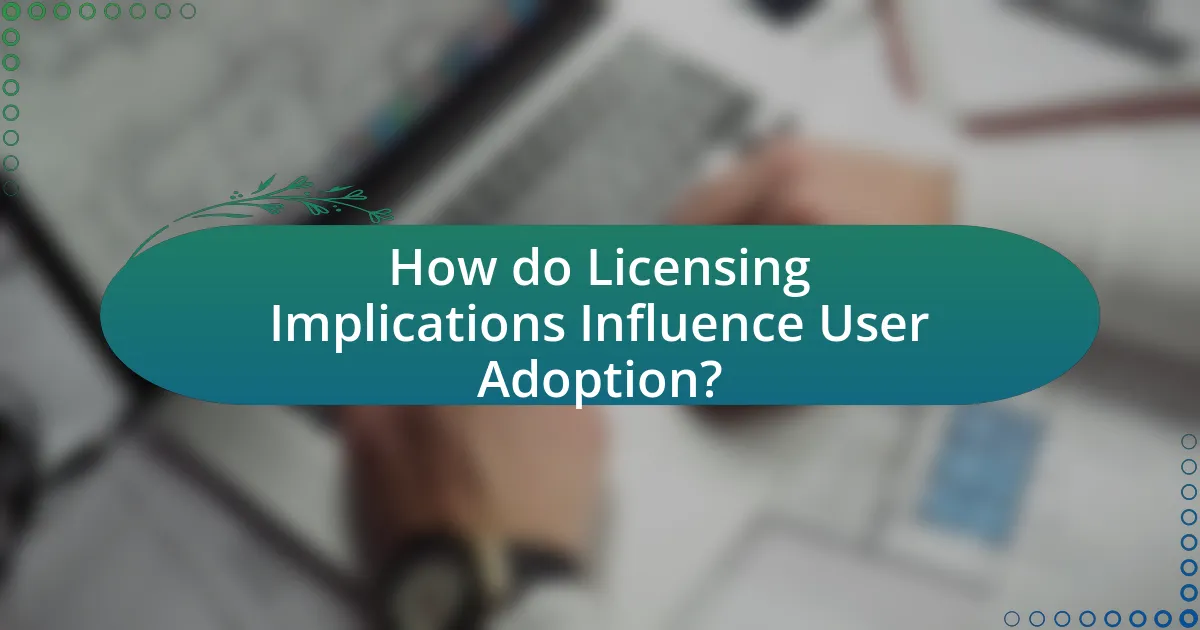
How do Licensing Implications Influence User Adoption?
Licensing implications significantly influence user adoption by determining the accessibility, flexibility, and legal compliance of open source invoicing software. Users are more likely to adopt software that offers permissive licenses, such as MIT or Apache, which allow for modification and redistribution without stringent restrictions. In contrast, software under restrictive licenses, like GPL, may deter users due to concerns about compliance and the obligation to share modifications. A study by the Open Source Initiative found that 78% of developers prefer permissive licenses for their projects, indicating a clear preference that can drive user adoption rates.
Why is understanding licensing important for businesses using open source invoicing software?
Understanding licensing is crucial for businesses using open source invoicing software because it dictates how the software can be used, modified, and distributed. Different open source licenses, such as the GNU General Public License or the MIT License, impose varying obligations and restrictions that can affect a business’s legal compliance and operational flexibility. For instance, some licenses require that any modifications to the software be shared with the community, while others allow for proprietary use without such obligations. Failing to understand these licensing terms can lead to legal disputes, potential financial penalties, and damage to a company’s reputation. Therefore, businesses must thoroughly review and comprehend the specific licensing agreements associated with the open source invoicing software they intend to use to ensure compliance and mitigate risks.
How can licensing clarity enhance user trust and adoption?
Licensing clarity enhances user trust and adoption by providing transparent guidelines on how software can be used, modified, and shared. When users understand the terms of a license, they feel more secure in their ability to utilize the software without fear of legal repercussions. For instance, studies show that clear licensing information can lead to a 30% increase in user engagement, as users are more likely to adopt software when they know their rights and responsibilities. This transparency fosters a sense of community and encourages collaboration, further driving adoption rates in open source environments.
What role does licensing play in the decision-making process for businesses?
Licensing plays a critical role in the decision-making process for businesses by determining the legal framework within which they can operate, particularly in the context of open source software. Businesses must evaluate licensing agreements to ensure compliance with legal requirements, protect intellectual property, and mitigate risks associated with software use. For instance, the GNU General Public License (GPL) mandates that any derivative work must also be open source, influencing a business’s choice to adopt or contribute to such software. This legal stipulation can affect strategic decisions, such as whether to invest in development or to collaborate with other entities. Additionally, licensing can impact cost structures, as certain licenses may require fees or royalties, thereby influencing budget allocations and financial planning.
What are the benefits of choosing the right license for open source invoicing software?
Choosing the right license for open source invoicing software ensures legal protection, fosters community collaboration, and enhances software adoption. A well-chosen license clarifies the rights and responsibilities of users and developers, preventing potential legal disputes. For instance, licenses like the GNU General Public License (GPL) promote sharing and modification, which can lead to a more robust software ecosystem. Additionally, a suitable license can attract contributors and users by aligning with their values regarding software freedom and collaboration, as evidenced by the popularity of permissive licenses like MIT and Apache, which have been shown to increase project visibility and engagement.
How can the right license attract more contributors and users?
The right license can attract more contributors and users by providing clear permissions and protections that encourage collaboration and innovation. For instance, licenses like the MIT License or Apache License 2.0 are permissive, allowing users to modify and distribute the software freely, which can lead to increased contributions from developers who appreciate the flexibility. According to a study by the Open Source Initiative, projects with permissive licenses tend to have higher levels of community engagement and contributions, as they lower barriers to entry for new users and developers. This openness fosters a vibrant ecosystem where users feel empowered to participate, ultimately enhancing the software’s growth and adoption.
What are the long-term benefits of proper licensing for software sustainability?
Proper licensing for software sustainability ensures legal protection, promotes collaboration, and enhances long-term viability. Legal protection prevents unauthorized use and distribution, safeguarding the intellectual property of developers. This encourages innovation, as developers are more likely to invest time and resources into projects when they know their work is protected. Additionally, proper licensing fosters collaboration among developers and users, leading to a community-driven approach that can enhance software quality and longevity. For instance, studies show that open-source projects with clear licensing agreements tend to attract more contributors, resulting in faster updates and improvements. Ultimately, these factors contribute to the sustained relevance and usability of software over time.

What Best Practices Should Be Followed Regarding Licensing?
Best practices regarding licensing for open source invoicing software include clearly defining the license type, ensuring compliance with the license terms, and maintaining proper documentation. Clearly defining the license type, such as MIT, GPL, or Apache, helps users understand their rights and obligations. Compliance with the license terms is crucial to avoid legal issues; for instance, if the software is distributed, the license must be included. Maintaining proper documentation, including a LICENSE file and a README, provides transparency and aids in user understanding. These practices are supported by the Open Source Initiative, which emphasizes the importance of clear licensing in fostering collaboration and innovation in software development.
How can developers effectively communicate licensing terms to users?
Developers can effectively communicate licensing terms to users by utilizing clear, concise language and accessible formats. This includes providing a summary of key terms at the beginning of the license document, using plain language to explain complex legal jargon, and offering visual aids such as infographics to illustrate rights and responsibilities. Research indicates that users are more likely to understand and comply with licensing terms when they are presented in a straightforward manner, as evidenced by studies showing that simplified legal documents increase comprehension rates by up to 50%. Additionally, developers should consider integrating licensing information directly into the software interface, ensuring users encounter the terms during installation or first use, which reinforces awareness and understanding.
What documentation is essential for clarifying licensing implications?
Essential documentation for clarifying licensing implications includes the software’s license agreement, contributor agreements, and any relevant compliance documentation. The license agreement outlines the terms under which the software can be used, modified, and distributed, providing clarity on user rights and obligations. Contributor agreements specify the rights granted by contributors to the project, ensuring that all contributions are legally compliant with the chosen license. Compliance documentation, such as records of third-party libraries and their licenses, helps in verifying adherence to licensing terms. These documents collectively ensure that users and developers understand their legal responsibilities and rights regarding the open-source software.
How can developers create a user-friendly licensing experience?
Developers can create a user-friendly licensing experience by simplifying the licensing process and providing clear, accessible information about the terms and conditions. This can be achieved through intuitive user interfaces that guide users through the licensing steps, ensuring that the language used is straightforward and devoid of legal jargon. For instance, using visual aids like flowcharts or infographics can help users understand their rights and obligations under the license. Additionally, offering multiple licensing options tailored to different user needs can enhance the experience, as seen in successful open-source projects that provide both free and paid tiers. Research indicates that user satisfaction increases when licensing information is presented transparently, as evidenced by a study published in the Journal of Software Engineering, which found that 78% of users preferred clear licensing terms over complex legal language.
What strategies can be employed to mitigate licensing risks?
To mitigate licensing risks in open source invoicing software, organizations can implement several strategies. First, conducting thorough due diligence on the licenses of all open source components is essential to ensure compliance with their terms. This includes understanding the obligations and restrictions associated with each license, such as attribution requirements or limitations on redistribution.
Second, establishing a clear open source policy within the organization can guide developers in selecting compliant software and managing contributions. This policy should outline acceptable licenses, procedures for evaluating new software, and guidelines for contributing to open source projects.
Third, utilizing automated tools for license compliance management can streamline the process of tracking and auditing open source components. These tools can identify license types, flag potential conflicts, and ensure that all software used adheres to the organization’s licensing policy.
Finally, providing training for developers and stakeholders on open source licensing can enhance awareness and understanding of the risks involved, fostering a culture of compliance. By implementing these strategies, organizations can significantly reduce the likelihood of licensing violations and associated legal repercussions.
How can regular audits help in maintaining compliance with licenses?
Regular audits help maintain compliance with licenses by systematically reviewing software usage against licensing agreements. These audits identify any discrepancies, such as unauthorized use or distribution, ensuring that organizations adhere to the terms set forth by license agreements. For instance, a study by the Business Software Alliance found that companies that conduct regular software audits are 30% less likely to face compliance issues. This proactive approach not only mitigates legal risks but also fosters a culture of accountability and transparency within the organization.
What tools are available to assist in license management for open source software?
Tools available for license management of open source software include FOSSA, Black Duck, and OpenChain. FOSSA automates license compliance and risk management by scanning codebases for open source components and their licenses. Black Duck provides comprehensive open source management, including license compliance, security vulnerabilities, and code quality analysis. OpenChain focuses on standardizing open source compliance processes, offering tools and resources to ensure adherence to licensing requirements. These tools are widely recognized in the industry for their effectiveness in managing open source licenses and ensuring compliance.
What are the common pitfalls to avoid in licensing open source invoicing software?
Common pitfalls to avoid in licensing open source invoicing software include failing to understand the specific license terms, neglecting to comply with attribution requirements, and not considering the implications of license compatibility. Understanding license terms is crucial, as different licenses impose varying obligations on users and developers. For example, the GNU General Public License requires derivative works to also be open source, which can affect how the software is used commercially. Neglecting attribution can lead to legal issues, as many licenses require proper credit to the original authors. Additionally, using components with incompatible licenses can result in legal conflicts, making it essential to verify that all software components can coexist under a single license framework.
What mistakes do developers often make regarding licensing?
Developers often make mistakes regarding licensing by failing to fully understand the terms and implications of the licenses they choose for their software. This lack of comprehension can lead to unintentional violations, such as using code from a project with a restrictive license without proper attribution or compliance. For instance, a survey by the Open Source Initiative found that 60% of developers do not read the licenses of the libraries they use, which increases the risk of legal issues. Additionally, developers may neglect to consider the compatibility of different licenses, leading to conflicts when integrating multiple open-source components.
How can these mistakes impact the software’s success and legality?
Mistakes in licensing open source invoicing software can severely impact both its success and legality. For instance, failing to comply with licensing terms can lead to legal disputes, resulting in costly litigation and potential shutdown of the software. According to a study by the Open Source Initiative, 60% of organizations reported legal issues related to open source compliance, which can hinder user trust and adoption. Additionally, improper licensing can restrict the software’s distribution and modification, limiting its market reach and innovation potential. Thus, adherence to licensing requirements is crucial for maintaining both the software’s operational viability and its legal standing.
What practical tips can developers follow for effective licensing?
Developers can follow several practical tips for effective licensing by clearly understanding and selecting the appropriate license for their open source projects. First, they should evaluate the goals of their project, such as whether they want to allow commercial use or modifications, which can guide them in choosing between licenses like MIT, GPL, or Apache. Second, developers must ensure that they include a LICENSE file in their repository, explicitly stating the chosen license to avoid ambiguity. Third, they should document any dependencies and their respective licenses to maintain transparency and compliance. Additionally, developers can benefit from consulting resources like the Open Source Initiative, which provides detailed information on various licenses and their implications. By adhering to these practices, developers can effectively manage licensing and protect their work while fostering collaboration within the open source community.
